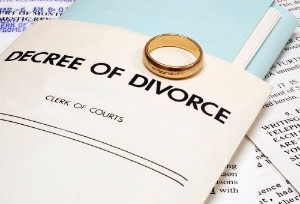Whether you have decided to start the divorce process or are just thinking about it, the New York Divorce Guide was created by Jamestown Divorce Attorney Scott Humble to help residents that are facing the end of a marriage.
 Sometimes marriages end. Despite the stigma against divorce, though, it is important to remember that ending a marriage does not necessarily have to be a negative experience. Once you and your spouse have made the decision to file for divorce, there are many hurdles to overcome; you have to sort out financial and property matters, you must each hire a divorce attorney as soon as possible, and you will need to notify friends and family. But despite the lengthy list of tasks, divorce proceedings are in no way required to be the emotionally heart-wrenching trials that you might expect.
Sometimes marriages end. Despite the stigma against divorce, though, it is important to remember that ending a marriage does not necessarily have to be a negative experience. Once you and your spouse have made the decision to file for divorce, there are many hurdles to overcome; you have to sort out financial and property matters, you must each hire a divorce attorney as soon as possible, and you will need to notify friends and family. But despite the lengthy list of tasks, divorce proceedings are in no way required to be the emotionally heart-wrenching trials that you might expect.
Download Our FREE Divorce Guide
No two married couples are quite the same, and in the same way, no two divorces are identical. Some couples may find themselves locked in heated battles lasting several years, each spouse swearing that the other was to blame for the failed marriage. Other couples view divorce as almost liberating, lamenting the end of the marriage while remaining amicable and looking forward to life afterwards. Because there are so many reasons to file for divorce and so many possible routes to take, you should seek the advice of a qualified divorce attorney early in the process. Whether you are simply exploring your options, or you intend to take urgent action, our office of divorce attorneys would be glad to help you move forward.
New York Laws Regarding Grounds for Divorce
There are three general categories of divorces: at-fault, no-fault, and separation. In the first of the three types of divorce, one spouse must prove that the other has committed a wrongdoing or a series of wrongdoings that has ruined the marriage beyond repair. No-fault divorces, in contrast, are filed when a marriage has simply broken down over a period of at least six months, and there is no one to legally blame for the end the marriage. Separation remains a widely used alternative to the above; separation can be granted when both spouses have elected to live separately for at least one full year.
 The grounds for at-fault divorces vary from state to state, and New York is among the majority of states that continue to recognize particular circumstances as grounds for divorce. While other states merely require proof that a marriage is “irretrievably broken,” New York recognizes identifies four specific justifications for an at-fault divorce: abandonment, adultery, cruelty, and imprisonment. If one spouse has refused to cohabit with the other for at least one full year, has had sexual relations with another person, has engaged in physical or emotional abuse, or has been imprisoned for at least three years since the start of the marriage, the other spouse may file for divorce. There are further specific criteria that a couple must meet in order to file for an at-fault divorce, and in order to determine if any of these grounds is relevant to your case, you should consult a New York divorce attorney for legal guidance.
The grounds for at-fault divorces vary from state to state, and New York is among the majority of states that continue to recognize particular circumstances as grounds for divorce. While other states merely require proof that a marriage is “irretrievably broken,” New York recognizes identifies four specific justifications for an at-fault divorce: abandonment, adultery, cruelty, and imprisonment. If one spouse has refused to cohabit with the other for at least one full year, has had sexual relations with another person, has engaged in physical or emotional abuse, or has been imprisoned for at least three years since the start of the marriage, the other spouse may file for divorce. There are further specific criteria that a couple must meet in order to file for an at-fault divorce, and in order to determine if any of these grounds is relevant to your case, you should consult a New York divorce attorney for legal guidance.
New York was, in fact, the last of the fifty states in the United States to permit no-fault divorce, adopting the legislation as recently as 2010. Though no-fault divorces can be smoother and less expensive than at-fault divorces, opting for a no-fault divorce merely to save time and money can potentially result in a disadvantageous outcome. If time is not a significant factor, separating from one’s spouse might be the optimal route to take. As long as both spouses have signed a Separation Agreement and lived at separate residences for at least 12 months, the couple can file for divorce using separation as its justification.
Divorce Laws That Set New York Apart

Though far less common today than in years past, domestic partnerships among all types of couples are still recognized and performed in certain jurisdictions across New York State, most notably in the New York City metropolitan area. Because these unions do not bear the same legal standing or benefits as marriage, they are subject to different laws when either or both partners seek to end their partnership. On a related note, while the state of New York has not allowed common-law marriages in over eighty years, New York does recognize such marriages when contracted in other states. A divorce attorney will help you to better determine how New York’s specific divorce laws apply to your domestic partnership or common-law marriage.
New York is among the 41 states that incorporate equitable distribution in divorce cases. Equitable distribution refers to the specific way in a divorce case in which property and finances are divided between the two former spouses. A key takeaway is that equitable distribution is not always the same thing as equal distribution; instead of a 50/50 split of marital assets, a judge or mediator will divide money, personal effects, and real estate according to each spouse’s particular circumstances. Time spent raising children, contributions to marital property, educational support, and earning ability are factors that can play a major role in determining which spouse receives which assets. Unless both spouses signed a prenuptial agreement that explicitly covered the distribution of marital property in the event of divorce, the court will have to decide how to divide assets. Though this distribution will likely be fair, it may not be equal.
Common Factors in New York Divorces
 Grounds for divorce and equitable distribution are merely the tip of the iceberg where divorce is concerned. Once you have decided to file for divorce, you will have to consider such issues as alimony (also known as spousal support), child support, pre-marriage surnames, and child custody. You should trust that your divorce attorney will be able to guide you through every last element of New York divorce law.
Grounds for divorce and equitable distribution are merely the tip of the iceberg where divorce is concerned. Once you have decided to file for divorce, you will have to consider such issues as alimony (also known as spousal support), child support, pre-marriage surnames, and child custody. You should trust that your divorce attorney will be able to guide you through every last element of New York divorce law.
Our law office has years of experience supporting clients at each stage of their divorce cases, and it is our pledge to help you achieve the outcome that you desire. Contact our office today to set up an initial consultation.
Download Our FREE Divorce Guide
Frequently Asked Questions | New York Divorce Guide
How Should I Prepare for Divorce?
Divorce has really changed over the last 30 years of my practice. Back before the law changed, we had to have grounds for divorce, whether it was cruel and inhumane, adultery, imprisonment, or abandonment. That’s a lot of what people think of as grounds for divorce. New York, of course, was the last state in the Union to go in to implement what’s known as a no-fault divorce. What that means is that it doesn’t matter if there’s fault like cruel and inhumane treatment or adultery, or whatever the case may be. You are entitled to a divorce, if you really want one, if you have not gotten along with your spouse for the last six months. Six months is not a lot of time and all you have to do is either testify in court or sign an affidavit that you haven’t gotten along, and your divorce will be granted.
How Long Does It Take to Get Divorced?
 There’s really no good answer for that because it depends on a lot of different factors. It depends on how quickly the package can be put together by the client. We obviously can go and do the paperwork very quickly to file it with the County Clerk and get it back. It depends on how the defendant is going to be served. If they already have an attorney, we usually have the attorney go and serve it on the defendant. If they don’t have an attorney, sometimes they come into the office and then there’s a 20-day period before we can proceed with the divorce.
There’s really no good answer for that because it depends on a lot of different factors. It depends on how quickly the package can be put together by the client. We obviously can go and do the paperwork very quickly to file it with the County Clerk and get it back. It depends on how the defendant is going to be served. If they already have an attorney, we usually have the attorney go and serve it on the defendant. If they don’t have an attorney, sometimes they come into the office and then there’s a 20-day period before we can proceed with the divorce.
If they’re not able to do any of those two things, then we must have them served. Normally, we hire the Civil Department of the Sheriff’s Department to go and have them served. They present us back with an affidavit of service, and then there’s a 20-day period for the defendant to go hire an attorney or try to represent themselves.
If they do nothing, we can go ahead with a default divorce. We can put the paperwork together quickly and send it off to the court. The court takes anywhere from four to six weeks to review it and sign off on it. The other possibility is that they hire an attorney. Once they do that, it really changes the ball game. With the other attorney, you’ve got to go through the full process. It’s not too often that we can go and settle things out of court.
I’ve seen cases go and take 18 months if they’re heavily litigated, and maybe two years, but that is not normal. That’s kind of the exception. I would say a ballpark would be nine months for an average divorce case to settle.
What Items Are Needed to File for Divorce?
Essentially, it comes down to everything related to finances, whether it’s income with pay stubs, tax returns, assets, titles to the house, the deed, titles to vehicles and so on. Then we get into retirement accounts, investments, checking accounts, savings accounts. It’s all financial. You must look at divorce in two parts.
There is the first part: whether you can get a divorce. Now that New York State has no-fault divorce, anyone can get a divorce after six months of not getting along and sign the affidavit or order to testify in court, and that part of the divorce is granted. The court calls that a bifurcated divorce because the first part is getting the divorce and the second part is the finances. The way I like clients to look at the finances is that it’s a partnership. It doesn’t matter who went to work and who stayed home, or who made more money, who made less money. The courts look at that and say, that’s a partnership and anything that came into the marriage is going to be split 50/50 with few exceptions.
The exceptions would be, for example, a gift. Your father or your mother passed and gave you something specific, let’s say it’s an antique. That is something that is separate property. Also, usually what is considered separate property as well is a personal injury type of compensation, whether it’s through civil litigation, or workers’ comp or disability. If there’s a lump sum, that can be considered separate property. Once you go and put it into a joint account, it becomes commingled and then it is marital property to be divided.
What Are Divorce Papers?
In a divorce under today’s statutes we are required not only to give a summons with a notice or a summons with a complaint to go and start the action to the defendant, but there are three other documents as well.
One is a QDRO notice, and that is telling you that you are not going to be able as a defendant, to be on the other party’s health insurance after the divorce. You’ve got QDRO rights, which means that you can go and get insurance from that company for six months. Usually that is cost-prohibitive. Another thing is an injunction. This is an injunction notice so that no assets in the divorce can be transferred so that everything stays status quo until the judge reviews it and makes sure that everything is divided the way that it should be divided.
The last thing is that you get notification that maintenance is now codified. The law states that there are specific calculations, as far as how the maintenance is determined. We add your income into the calculator that we have on the internet, and it tells us exactly how much that maintenance is.
Can My Spouse Pay the Divorce Fees?
I had an elderly client come in the other day. She was not the bread-winner. There were definite factors that she really needed a divorce and wanted a divorce, but her concerns were whether or not she could afford it. Her husband makes a lot of money and she doesn’t, and she was concerned whether or not she could afford to actually get a divorce. The answer is yes, because the court is going to impose on her husband paying some of her attorney’s fees. It’s an equitable type of idea that the court imposes. It would be fairer for him to pay for her attorney’s fees, at least in part, so that she could get the divorce. An extension of that is that we’re going to look at a support issue of marital support, and there’s going to be a definite alimony situation in that case.
How Can I Minimize Divorce Expenses?
 Just your filing fees alone are going to be between $400 and $500. Of course, that may change. It always seems to go up and it never goes down.
Just your filing fees alone are going to be between $400 and $500. Of course, that may change. It always seems to go up and it never goes down.
Keeping that in mind, that’s a substantial expense, but then you’ve got the attorney’s fees that you’re concerned about. The least expensive way is what I call “on the papers” or a default divorce. That’s where the other side doesn’t fight what we’re going to do, as far as doing the default divorce. Once there becomes a fight and they hire an attorney, it goes from a default situation to a litigation.
Let me explain two types of retainers that we have, flat-fee or an hourly fee. I like to keep people in the flat-fee area because that way they know exactly how much the fee is going to be and it works out to their benefit. It’s a set amount, pick a number, and that is going to be it as far as your attorney’s fees on a divorce. However, once the other side goes to an attorney and it becomes a fight, everything changes.
Should I Move Out of the Marital Home?
The answer is no. Unless there is abuse and you need to get out.
The reason that I don’t like clients moving out unless there’s a good reason to do so is finances. Once you go and you move out, normally speaking, you basically double the household expenses in that now you have additional rent to pay and you’ve got different utilities to pay. Unless money’s not a problem for you.
I think that the general answer is no. As far as moving out with the children, that still applies, but if that’s required, we either would go to Supreme Court on an order to show cause to make sure that you have temporary custody, or Family Court to go get you custody and/ or support.
How Should We Handle Bills During Divorce?
For most clients that I see, the finances are relatively tight, so it’s very important for them to maintain the status quo of the finances; income and expenses stay the same. That’s why I usually recommend that they stay in the same household until the divorce goes through, unless there are problems such as abuse. The reason for this is if they were to go and split, the person moving out is going to have additional expenses as far as rent, utilities, etc. and all of a sudden, there’s going to be a problem. There’s going to be a crunch as far as paying student loans, automobiles, and then they’re going to go into financial ruin as well. I advise the parties to stay together during the term of the divorce.
What Is Marital and Separate Property?
I was discussing with a divorce client the differences between marital property and separate property. The assets that are going to be split are marital property, something that’s joint, and then you’ve got the separate property that is not going to be split. Your separate properties are going to be inheritances, personal injuries and gifts. Those are the big three that are separate property and will not be distributed to the other party.
The exception to that is if you commingle. Commingling is nothing more than mixing the property with your spouse. If you get that inheritance, personal injury, gift, etc., and you put it into a joint account, it’s probably going to be considered marital property and get split.
What Is Equitable Distribution?
Equitable means fair, and distribution means how it’s going to be split up. I think the best way to go and look at equitable distribution is that it’s a partnership between husband and wife. It doesn’t matter who is making more money, what really matters is what did they purchase together; that would be assets of the marriage. Retirement accounts are going to be split 50/50. Equity in the house is also split 50/50.
As a practical standpoint, do we want to go and get into actually selling houses, pulling the proceeds? Only if we can’t get along, that’s what the judge is going to order and that’s what we can agree to. Most of the time what happens is one party buys out the interest of the other party and keeps the house. As far as the mortgage, whoever keeps the house normally is supposed to refinance within a certain period.
Will I Lose the House in Divorce?
I met with a divorce client with a huge concern about losing assets because of the divorce. His particular attention and focus was if he will lose his house during the divorce. The answer is probably not, as long as we can work something out. If there’s litigation hard and fast with the other side, and they’re fighting and won’t agree to anything, frankly, the judge is going to order that the house is sold, and the equity is split 50/50. If that doesn’t happen, usually what we can do is work it out so that one party can go and buy out the other party’s interest.
What I mean by that is there’s going to be a determination, either through agreement or appraisals, as far as how much the house is worth. Then you take away from that anything that is owed against the house, and then that is going to be your profit, or what we call equity. That equity is split between the two parties, so you divide it by two, and that’s the amount that one party has to go and pay on the other party to and be able to buy off the interest. That is the normal course of action that we can usually work out.
Now, the concern with the party that is being paid and not keeping the house is that it is going to be leverage against their credit score or their income-to-debt ratio, so as far as them going out and getting future credit. Especially on another mortgage for a house, that is going to be detrimental to their credit score and income-to-debt ratio, so there’s a time limit put on the situation as far as how fast the case must be refinanced. Whoever gets the house must refinance the house, usually within six to eighteen months, so it won’t detrimentally affect the other person.
Can a Father Win Custody?
 I had a client that came to see me, because his wife actually moved out. He’s a primary caregiver for the children. There was a concern, though, that the wife hasn’t been complying with what kind of visitation rights my clients wants to see. In that kind of case, we’re going to Family Court because it’s a little bit quicker, and we’re going to seek an order of custody for my client, so that the children cannot be taken out of the county. Of course, the mother will get visitation, and we’re also doing a support petition because she needs to pay support. The theory here is basically what is in the best interest of the children. New York State is very conscious, and the judge is not to discriminate against a father or a mother.
I had a client that came to see me, because his wife actually moved out. He’s a primary caregiver for the children. There was a concern, though, that the wife hasn’t been complying with what kind of visitation rights my clients wants to see. In that kind of case, we’re going to Family Court because it’s a little bit quicker, and we’re going to seek an order of custody for my client, so that the children cannot be taken out of the county. Of course, the mother will get visitation, and we’re also doing a support petition because she needs to pay support. The theory here is basically what is in the best interest of the children. New York State is very conscious, and the judge is not to discriminate against a father or a mother.
What Is a Non-Custodial Parenting Schedule?
I think the best arrangement that the court would go for is whatever you can work out mutually. Both parties are going to have to get along to do that, but that is the best. Normally, I alternate holidays. They’re with their mother on Mother’s Day, father on Father’s Day, and then split the other ones, and split the vacations. It doesn’t matter if it’s winter, spring, summer, those vacations should be split.
If the parents can’t get along, then in addition to splitting the holidays and the vacations, normally the individual that gets visitation would get visitation every Wednesday from after school, when school’s in session, to the next morning. They would drop off their child or children at school the next morning – and every other weekend would be a standard type of visitation schedule.
What Is Joint and Sole Custody?
I was in Family Court recently with an unusual case. The usual situation when people go divorce is to go and have joint custody of the children, so both the mother and the father can go and make decisions as far as school, religion, medical, whatever the case may be. In this case, the judge felt uncomfortable giving joint custody because the father is actually a California resident, and he has just moved here, and the judge doesn’t know if it’s temporary or not and was very concerned. He gave the mother full custody and only visitation to the father for that reason. The father technically will get information as far as what’s going on at school, religion, and medical, but he won’t be able to technically make the decisions or make a joint decision on that if the wife doesn’t want him to.
Can I Get Shared Custody?
If that has been the history, that both the mother and the father have been giving primary care to the children, then that is absolutely what should be continued if possible. That’s a great idea. I do have clients come in with the misconception that if they step up to the plate and have the children half the time, that they won’t have to go and pay child support. That has absolutely nothing to do with it. Whoever makes more money, bottom line, is going to end up paying child support.
How Do You Calculate Child Support?
I was discussing child support with a client the other day, and they were asking me how it gets calculated. There is a computer program calculator that you use to go and calculate the child support. You pop in the different numbers, as far as the income, take out the FICA, or Social Security, and crunch the numbers. It’s simple as far as what the number is going to be and how child support should be paid.
Now, that is under the Standards Act and if there’s litigation, that’s the way the judge is going to rule. However, on occasions, if you want to go work something out and you’re willing to take less for some reason – maybe the other party is helping you out extra somehow and you want to take less – we have to go and mention, on the record, how much child support should be and that you want to opt out. You don’t have to take that amount, but you are entitled to that amount.
Can I Keep My Partner’s Health Insurance After Divorce?
I was talking to a client recently about medical insurance. He’s got some medical issues and he was concerned what he was going to do as far as medical care after the divorce. He was really interested in staying on his wife’s plan because she has a good job and good insurance, and that’s the way it’s been in the past. He wanted to continue to do that after the divorce decree or judgment, and that is just not possible. Because they are no longer technically family once the divorce goes through, they can’t be on a family plan; it’s a simple as that, although unfortunate.
What Is Spousal Maintenance?
 I had an older client come in the other day and ask me about alimony. To me, that’s a very clear-cut issue; everybody knows what you’re talking about. That’s not the term that New York State uses anymore. Now it’s called maintenance for short, or spousal maintenance. Again, this is the old-fashioned alimony. What New York State has done is they have codified so that they haven’t left it up to judges to go and determine, because you’ve got different judges in different areas of New York State making different determinations as far as how much maintenance should be paid by whoever has the higher income.
I had an older client come in the other day and ask me about alimony. To me, that’s a very clear-cut issue; everybody knows what you’re talking about. That’s not the term that New York State uses anymore. Now it’s called maintenance for short, or spousal maintenance. Again, this is the old-fashioned alimony. What New York State has done is they have codified so that they haven’t left it up to judges to go and determine, because you’ve got different judges in different areas of New York State making different determinations as far as how much maintenance should be paid by whoever has the higher income.
What they did is they put it into the form of a calculator on a website. We crunch the numbers and the calculator is going to give us how much maintenance should be paid, whether it’s weekly, bi-weekly, monthly or whatever the case may be.
What Are the Types of Spousal Maintenance?
In New York State, they have taken away the calculation of spousal maintenance from the judges and made it uniform across the state because they had different determinations for different judges throughout the state. The way that they did this is two-fold. They put together what is essentially a calculator of maintenance, but they also went and gave us parameters, as far as how long someone would have to go and pay maintenance depending on how long you’ve been married.
If you’ve been married zero to fifteen years, your support is going to be for 15 to 30% of the marriage. If you have been married 15 to 20years, it’s going to be 30% to 40% of the marriage. If it’s over 20 years that you’ve been married, it’s going to be 35% to 50% of the marriage. As you can see, if you’ve been married for quite a while, you’re going to receive maintenance for a long time.
Can I Discharge Spousal Maintenance through Bankruptcy?
I was speaking with a client yesterday afternoon about whether something can be done with the spousal maintenance that they are paying. They were kind of curious if it could be taken care of in a different manner, maybe run through bankruptcy to get rid of it or something like that. Before October 17, 2005, the answer was maybe. It depends on the judge. On October 17, 2005, a new bankruptcy law was implemented, which specifically says that this is a non-issue, and this cannot be discharged whatsoever. It goes along with all your type of Family Court payments including maintenance, child support, equitable distribution. Whatever the case may be, bankruptcy is not going to affect it.
Download Our FREE Divorce Guide

buy generic cialis online Cialis 20 Mg Efectos
I’d like w divorce, what do I do!!
Plz help me asap.. im desperate!